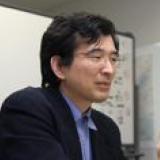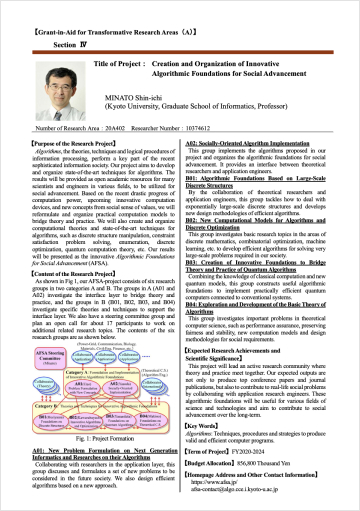Overview
2020-2024 Grant-in-Aid for Transformative Research Areas, MEXT, Japan
Algorithmic Foundations for Social Advancement
Creation and Organization of Innovative Algorithmic Foundations for Social Advancement
Algorithms, the theories, techniques and logical procedures of information processing, perform a key part of the recent sophisticated information society. Our project aims to develop and organize state-of-the-art techniques for algorithms. The results will be provided as open academic resources for many scientists and engineers in various fields, to be utilized for social advancement. Based on the recent drastic progress of computation power, upcoming innovative computation devices, and new concepts from social sense of values, we will reformulate and organize practical computation models to bridge theory and practice. We will also create and organize computational theories and state-of-the-art techniques for algorithms, such as discrete structure manipulation, constraint satisfaction problem solving, enumeration, discrete optimization, quantum computation theory, etc. Our results will be presented as the innovative Algorithmic Foundations for Social Advancement (AFSA).
The AFSA-project consists of six research groups in two categories A and B. The groups in A (A01 and A02) investigate the interface layer to bridge theory and practice, and the groups in B (B01, B02, B03, and B04) investigate specific theories and techniques to support the interface layer. We also have a steering committee group and plan an open call for about 15-17 participants to work on additional related research topics.
Organizational structure diagram of this area

Shin-ichi Minato is a Professor at Dept. of Communications and Computers Engineering, Graduate School of Informatics, Kyoto University (concurrently in Undergraduate School of Informatics and Mathematical Science, Faculty of Engineering). His research interests include efficient representations and manipulation algorithms for large-scale discrete structure data. He received the B.E., M.E., and D.E. degrees in Information Science from Kyoto University in 1988, 1990, and 1995, respectively. He had been working at NTT Laboratories since 1990 until March 2004. He was a Visiting Scholar at Computer Science Department of Stanford University in 1997. His original data structure “ZDD” is minutely discussed using many pages in the Knuth’s book “The Art of Computer Programming” (Vol. 4, Fascicle 1, 2009). He published “Binary Decision Diagrams and Applications for VLSI CAD” (Kluwer,1995). From 2014, he serves a Research Area Advisor for JST PRESTO “Social Infomation Infrastructure” project and JST ACT-I “Information and Future” project. He is a senior member of IEEE, IEICE, and IPSJ, and a member of JSAI and JSCS.
Area outline explanatory material
Publication: Ministry of Education, Culture, Sports, Science and Technology official website



